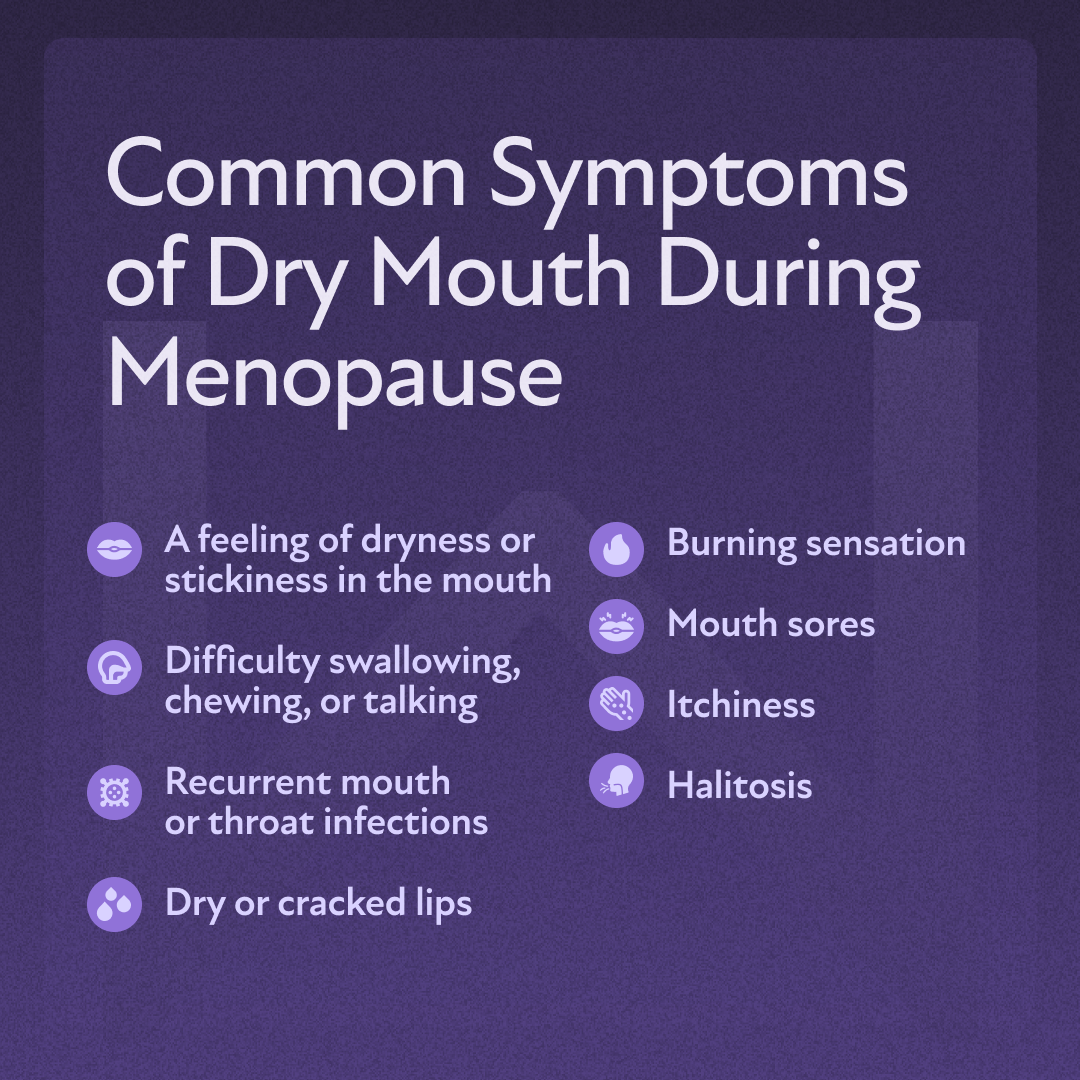Hormonal fluctuations during menopause affect many of the body’s systems, including the reproductive system, musculoskeletal system, and even the digestive system. Digestion starts in the oral cavity, and for some women, the mouth can become increasingly dry during menopause. Compared to hot flashes, vaginal dryness, and psychological changes, menopause-related dry mouth isn’t as widely discussed. This article will outline the causes, symptoms, and treatment options for this common yet lesser-known symptom of menopause.
The Link Between Menopause and Dry Mouth
The reason some women may experience dry mouth during menopause is believed to be similar to why many women also experience vaginal dryness. Shifts in hormone levels can cause cellular changes in the mucosal epithelium — the surface layer of the mucus membrane that lines many of the body’s organs. Hormonal fluctuations during menopause can cause the mucosal epithelium in the mouth to become thinner, increasing the risk of pain, injury, and dryness. As a result, dry mouth is commonly reported among perimenopausal and postmenopausal women.(1)
Common Symptoms of Dry Mouth During Menopause
Mouth dryness may not feel the same for everyone. Women may experience the following symptoms of dry mouth during menopause:(2)
A feeling of dryness or stickiness in the mouth
Difficulty swallowing, chewing, or talking
Burning sensations
Itchiness
Mouth sores
Recurrent mouth or throat infections
Dry or cracked lips
Halitosis (bad breath)
Menopausal Dry Throat
Some women may find that dry mouth symptoms extend to the throat. Changes in the mucosal lining of the respiratory tract due to hormonal shifts may cause dryness or irritation in the throat. A study published in the Journal of Menopausal Medicine found that menopausal women experienced vocal symptoms such as dryness and frequent throat clearing more often than premenopausal women. However, more research is needed on the potential contributing factors to vocal symptoms that occur during menopause.(3)

Causes of Menopause-Related Dry Mouth
Studies have found a relationship between dry mouth and fluctuating levels of estrogen and progesterone in the body. Estrogen and progesterone receptors are present in the cells of the mouth's mucosal lining and salivary glands, meaning changes in levels of sex steroid hormones may affect the quantity, consistency, and pH balance of saliva. Saliva helps keep the mouth lubricated, but research suggests that salivation decreases during menopause, which can lead to dry mouth and other dental issues such as cavities, infections, and changes in taste.(1)(4)
Oral discomfort can also impact emotional well-being. Psychological distress may aggravate menopause-related oral symptoms by activating the autonomic nervous system. The autonomic nervous system consists of the parasympathetic nervous system, which controls the body’s “rest and digest” action, and the sympathetic nervous system, which regulates the body’s “fight or flight” stress response. The sympathetic nervous system also regulates salivation, meaning stress and anxiety may contribute to dry mouth. Additionally, psychological symptoms may influence how hydration levels in the mouth are perceived, making symptoms feel more intense.(1)
When does dry mouth occur during menopause?
Not all women experience dry mouth during menopause. For those who do, symptoms may be worse at night when the body naturally reduces saliva production.(4) Vasomotor symptoms like night sweats are also common during menopause. Increased sweating may lead to dehydration, which can exacerbate dry mouth symptoms.
Natural Remedies for Menopause-Related Dry Mouth
Practicing good oral hygiene is particularly important during menopause to help manage symptoms of dry mouth. The American Dental Association (ADA) recommends that individuals brush their teeth with a soft-bristled toothbrush and fluoride toothpaste twice a day for two minutes to reduce plaque buildup and protect against cavities. Regular flossing and using an interproximal brush to clean between teeth are also recommended.(5)(6)
The following lifestyle changes may also help relieve symptoms of dry mouth experienced during menopause:(2)(4)
Drinking Enough Water: It’s recommended that women drink approximately 11.5 cups of fluid daily to maintain adequate hydration levels.(7)
Avoiding Mouthwashes Containing Alcohol: Alcohol can dry out the mouth or aggravate symptoms.
Limiting Spicy or Salty Foods: These food items may worsen dry mouth by triggering burning sensations.
Minimizing Caffeine Intake: Coffee, energy drinks, and other caffeinated beverages can dehydrate the mouth.
Chewing Sugar-Free Gum: Chewing gum can boost saliva production, helping to relieve dry mouth.
Running a Humidifier: Using a humidifier in the bedroom at night can increase moisture levels in the air while sleeping.
Managing Stress Levels: Stress may worsen feelings of dry mouth. Meditation, exercise, and getting plenty of sleep are all effective strategies for mitigating stress.
Refraining from Smoking: Long-term smoking has been shown to reduce saliva production. It may also alter the consistency of saliva. One study found that people who smoked had thicker saliva than those who did not smoke.(8)
Using Supplements: While evidence is limited, certain supplements such as green tea, thyme honey, ginger, or aloe vera may help relieve symptoms of dry mouth. These natural remedies may be available as teas, mouthwashes, or sprays, among other forms. Women should consult their doctor before trying any supplements or medications.(9)
Medical Treatments for Dry Mouth During Menopause
In addition to hormonal fluctuations, dry mouth can also be influenced by age, underlying health conditions, or the use of certain medications. Therefore, treatment options may vary. A doctor may recommend the following treatments for menopausal women experiencing dry mouth:(1)(4)
Artificial Saliva: Also known as saliva substitutes, these sprays, gels, or liquid products contain salivary enzymes that increase lubrication and protect against bacterial growth in the mouth.
Hormone Replacement Therapy (HRT): HRT treatments are used to reduce vasomotor and vulvovaginal symptoms of menopause by supplementing levels of sex steroid hormones that decline during this stage of life. Given the relationship between hormones and salivation, increasing estrogen and progesterone levels in the body may subsequently reduce dry mouth symptoms. Research findings vary, but some studies have shown that HRT can increase salivary flow rates in menopausal and postmenopausal women.
Salivary Electric Nerve Stimulation Devices: These devices are inserted into the mouth and use neuroelectrostimulation to promote saliva production. One study found that neuroelectrostimulation of the salivary glands increased salivary flow rates in postmenopausal women with dry mouth as well as those without the condition.(10)
Prescription Sialogogues: These dry mouth treatment medications boost saliva secretion. However, they are primarily prescribed for cases of dry mouth associated with radiation therapy or an autoimmune disorder called Sjögren’s syndrome.


